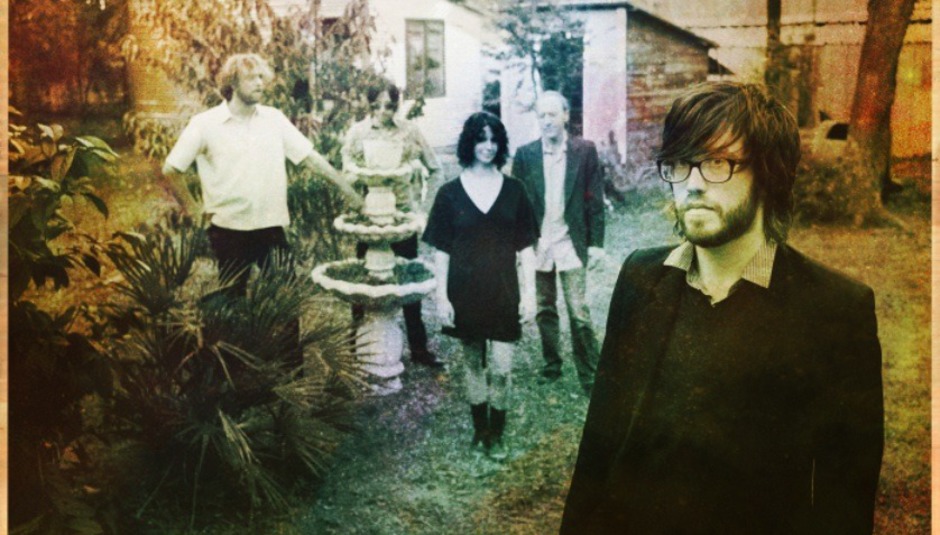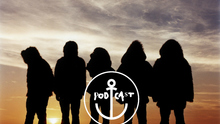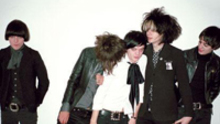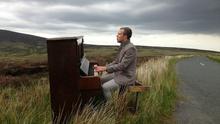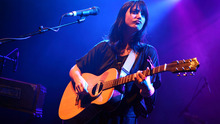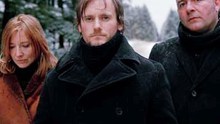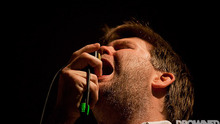Will Sheff was in London recently to play an acoustic show ahead of Okkervil River’s forthcoming LP I Am Very Far – the band’s first album for three years and sixth in total. Confusingly, DiS called him from Barcelona.
[Caveat: This is quite a long one, but Sheff makes for such a great interviewee it’s well worth getting yourself a brew and some headphones for.]
DiS: How’s the reaction been to the new material so far – you guys played South by South West?
Will Sheff: Yeah, we played some songs at South by South West and that was actually the first time since we were making the record that we went back into the rehearsal space and were like: “How the hell do we make this all happen, live?” It was a completely different challenge, you know? It was a lot of work to get [the songs] up to speed, but it was really rewarding; every single one of them is like a little puzzle that we’re trying to put together. Finally making it happen and playing them onstage for everybody was really exciting.
DiS: How was it playing with the Roots on Jimmy Fallon?
WS: That was really great – I’m a huge fan, so that was really a pretty awesome experience.
DiS: It seemed to suit ‘Wake and Be Fine’ really well, with the two drum kits…
WS: Yeah, it was great as there’s actually two drummers on the original recording, and in fact it’s very difficult to play with just one person because of the trade-off things back and forth, so getting to have Questlove there, right next to Cully [Symington]…of course, Questlove is one of Cully’s heroes, and a drumming hero for many, so he was really excited too.
DiS: You’ve spoken about how the promotional cycle for your records isn’t something that generally appeals to you – that what you’d rather be doing is just getting on with working, and writing.
WS: Absolutely, and it’s a funny circumstance, because you’re trying to promote these songs and these records – which keeps you making more – but the ironic thing is that you can get so caught up in this system of just promoting and touring around and doing press tours and all, that you’re being kept away from the whole reason that you started to do it in the first place, which is the process of writing and recording. It’s a kind of ironic set-up. I don’t mean to sound ungrateful by saying that because obviously there would be no more money or interest to continue making records if I didn’t do this – but it’s a funny thing, when you’re thinking “All these promoting songs is keeping me from making songs.”
DiS: It seems like you come up with lyrics, or ideas, in some fairly odd places – do you find it possible to write on the road?
WS: I do, actually. ‘Rider’ from this record was written on a plane. I was taking an international flight and I was trying to sleep – I’d been trying to sleep for like, five hours – and I just couldn’t manage to do it. I was sitting in the cabin, surrounded by all these pass-outs and people with all the lights out, and I just started…somehow that song popped into my head, and I just started writing it in my head. As I was doing it I was picturing the instrumentation and the arrangement and all that stuff, and the lyrics are just me talking about the flight, right at the top of the song. ‘The Valley’ was written while I was in San Francisco for a festival – I was sleeping in a hotel and those lyrics popped into my dream; there’s another one, ‘I Guess We Lost’, that was written on a plane. So it’s actually not that hard for me. There’s a lot of different ways to write a song, but I find that my favourite songs are the ones where lyrics and melody come right away, out of nowhere. And that can happen anywhere, really.
DiS: I was going to ask if you had any preferred methods, or places, even, to write…
WS: There’s a lot of different methods. There’s writing lyrics first and putting a melody to them; there’s writing music and then figuring out what the lyrics are going to be; and then there’s my favourite: when they come together, completely united. I think that those are the most…the songs that feel the most natural, and right. And then there’s other methods, like taking a song and turning it backwards and transcribing exactly how it goes, or taking a song that’s in another language and thinking, “What are they saying? If they were speaking in English, what would they be singing?” I like a lot of those methods that have an exquisite corpse quality or something like that, which you can play on yourself to access a different part of your brain than you’d otherwise be using.
DiS: I Am Very Far is a very grand, big-sounding album, and certainly a departure from The Stage Names and The Stand Ins. Why did you choose to record it in so many different sessions?
WS: Well, the way that we’ve worked on records in the past – which is the way I think a lot of bands work on records – it’s that whole thing of holing up in the studio and just going completely insane working. There’s a certain point where it starts to feel like a day job, like, “Mmm okay, gotta go the office.” And when you start to feel that way…I just feel like in some ways that’s kind of a sin, to feel that way about something that’s supposed to be this really sacred thing to you. I didn’t want to get into that situation where it’s like, “Oh, punch the clock, now I’m leaving the office,” so for that reason I thought why don’t we completely move around – it was something like six different studios in the end – go all over, and every time we would try a completely different technique.
So there’d be one which would be pretty standard Pro Tools Assembly, then the next one everything would be live to eight-track, all in the same room with live vocals, and then there’d be one would be with a huge band: two drum-kits, three pianos, two basses, five guitars, extra percussionists…so every single time it was like we had torn up the formula by throwing some different challenges in there, so you came into the recording sessions and you were really really excited, whereas in the past I was so holed up I was almost losing my interest in doing it. And also in the past I felt like I had some of my favourite and best ideas when the whole recording process was over and I couldn’t even do anything about it, so I felt like I had to really take charge of my own process. In a sense, the production of the record started right with the writing phase – and the writing kept on going till the end of the production phase.
DiS: Did you ever think that approach might detract from making something cohesive?
WS: I knew that that was something we were courting by doing this, but I didn’t really care that much. In the past I think our records have felt extremely cohesive, in fact some of them to a fault. There’s a certain thing when you’re in a recording situation where you go: “Alright, next track, now we’re going to do organs – so let’s put organ on every song that needs organ.” So you record all the organ parts at once, they all sound the same, and then it’s like, “Now let’s do tambourine on the drums - every song that needs tambourine, let’s put it on!” And so you end up with this very uniform-sounding thing that’s maybe not as creative. The way we were working, every single time instead of saying “Let’s have organ,” it was like, “Let’s have a rhythm element – what should it be?” We could approach it in a completely novel way each time, so that’s why we had things like duct tape beating on the reel instead of a tambourine, or instead of an organ, let’s have all of us singing the same note simultaneously, then singing another note then another one, like a vocal synthesiser. It was so much more fun than an assembly-line technique.
DiS: The record really traverses a vast range of emotions – where songs like ‘The Valley’ or ‘White Shadow Waltz’ convey a very different feeling (and real tension) compared to something like ‘Your Past Life as a Blast’, for example, which sounds so jubilant.
WS: I really believe that if art is the kind of thing that’s going to be meaningful to people in their lives – and if it’s going to provide comfort or some kind of beauty – it has to acknowledge pain, or else it seems like bullshit. It has to acknowledge ugliness and pain and unfairness, violence and all these things, because we all know that that shit is real and that that’s what ruins everything good in some way, or at least touches it; colours it. So I think that you have to acknowledge it, and a song like ‘White Shadow Waltz’ or ‘The Valley’ delves pretty intensely into that. But I still think in those songs there’s pleasure and there’s fun – there’s playfulness.
A song like ‘Your Past Life as a Blast’, it’s a pretty happy song, but I also took pains to make it acknowledge that dark and unfair aspect about life. It’s a great example of me trying to write a happy, summery song that also acknowledges unfairness and misery and darkness. To me it’s a big part of being an adult, where you’re like: “I’m never going to get exactly what I want; the world’s never going to be exactly the way I want it to be – in fact, there will be things that are going to be hard to endure.” The point is trying to find joy in this.
DiS: I’ve read that you don’t want to get into, too much, the themes or even the title of the record. Now that it’s all done, though, has it turned out like you envisioned?
WS: It has and it hasn’t I guess, because unlike a record like The Stage Names, I wasn’t envisioning the whole thing from the very beginning. And that was part of the point – the idea of what was going to be became bigger and bigger in my mind over the making of the record, whereas The Stage Names was a very set-in-stone idea that I set out to make exist. So yeah – it does what I want it to do, but it doesn’t sound like what I thought it was going to sound like – because I didn’t really have anything that I thought it was going to sound like.
DiS: You’ve also spoken of the record as being like a “trip,” which completely chimes with all the different recording sessions and approaches. How many players are there on it in total, do you think?
WS: Oh man. Ummm…40? Something like that, maybe? I’m really bad with numbers – I’m like a mother bird who can’t count all the babies in the nest, I can’t be depended upon to tell you. But that’d be my guess, off the top of my head. It may be way off!
DiS: And in terms of bringing it to the stage, is there a core line-up for the band?
WS: Yeah – it’s the same band that plays on the record more or less. We also have a new member, Michael St. Clair, who just joined, he’s going to be doing a lot of strings and keyboard stuff, but it’s more or less the same band. In fact, that’s why some of these songs came together really quickly when we were rehearsing them. If you listen to a song like ‘Show Yourself’, you’re basically hearing us just playing in a room – there’s not a lot of extra stuff on there. Even a song like ‘Rider’ or a song like ‘The Rise’, more or less, aside from the orchestral parts, you’re really just hearing a six-person band playing together.
DiS: Who is that on backing vocals on ‘Hanging From a Hit’?
WS: That’s Beth Wawerna, who also sings on ‘Lay of the Last Survivor’, that kind of Christine McVie backup vocal, and who also sings some of the harmonies on the Roky Erickson record that I produced before that. She’s in a band called Bird of Youth. I like a low-ish sort of, cool female harmony. I’ve got a more stylised, higher voice – I think it’s a nice combination. We were able to do stuff like that on this record – occasionally there’s two other female backup singers, like on ‘The Rise’, those big vocal parts, like Dark Side of the Moon, which in the past I would have been very afraid of. But I believe that there’s no kind of instrument or arrangement or technique that can’t be used in a cool way, and I was really challenging myself to do things that it feels like I shouldn’t be doing with this one – like having backup singers.
DiS: That’s another song where parts were written in your head before getting to the studio…
WS: Interiority is a really important thing to me, and a lot of this record did come from a subconscious, unconscious place, and I wanted it to respond to that corresponding place in listeners. I wanted it to really feel like it was operating on a subterranean level, and writing in your head is good for that, because in a sense I’m trying to sing into your head.
DiS: It seems like dreams and the subconscious is a recurring theme here – sometimes that comes through explicitly, in a song like ‘Wake and Be Fine’, but there are references and otherworldly allusions throughout.
WS: When I was a kid, and I feel like probably a lot of kids are this way – in the forming period of your life, when you become who you are and create your personal…whatever – I remember feeling like a lot of the things I experienced weren’t actually real. I have specific memories of things I saw or hallucinated or dreamed that I thought were real, and they make up a big part of my memory from that time. There’s this real sense of another world that was hiding behind everything else, everything that was normal. I believe that that other world is still around, it’s just so hard to…access and discover it. You have to be really attuned to it. I wanted this record to head towards that unknown region, you know?
DiS: And is there anything that you’re most proud of from the record?
WS: ‘The Rise’ I’m very proud of as a recording. We played that song a lot, trying to get it just right. You know, there’s these lengthy passages of improvising and chaotic elements and stuff. The recording came out really great and the mix came out really great; we captured this feeling that I really wanted to capture.
DiS: Last time we spoke we talked about this idea of being a “professional failure” that you adopted. Since then you’ve collaborated a lot, and of course you were nominated for a Grammy Award for the liner notes in the Roky Erickson album you produced. Does that notion still hold?
WS: The failure thing for me, it’s like how I felt about the Grammys. When I got nominated for that Grammy I thought, “Oh what the hell – I’m not going to win it.” That was my first thought, like, no way am I going to win it. My second thought was well: if I win it I’ll put it in my bathroom. I just think awards ceremonies now…it’s all complete bullshit. If you’re desperately consumed by wanting to win an award, the joke’s on you; your priorities are all fucked up as an artist. If you don’t win an award obviously it doesn’t mean anything at all – I mean look at the Academy Awards this year – in fact, every single year – and what wins and what doesn’t…
So for me the failure thing is always this way of going, you know, “Who cares?” I don’t want to be desperately striving for people to like me. Because it’s a way to become everybody’s slave, become like this clown. I feel like…this sounds really corny, but when I’m trying to make a piece, it needs some kind of very intangible audience. It’s almost like, the ‘gods of art’, or something [laughs]. An offering to the gods of art, who I know are going to find all kinds of flaws with it and hate it anyway, but they’re the people that I’m trying to appeal to.
DiS: You wrote about the Grammys for Billboard, and have written plenty about music in your time – do you have any plans to do any more?
WS: I love writing, I’d like to do it a lot more – it’s really just a question of finding the time. I started out writing – I was making music and I was writing but I…you know, nobody gave a shit [laughs]. So I was paying the bills for a little while with writing, and I really enjoy doing it, me being an opinionated person who loves to hear himself talk, so it’s a good occupation for me. I just need more time to do it, really.
DiS: Have you ever written in any other forms, like prose, or for the stage?
WS: I’ve always written prose and poetry alongside lyrics, but it was never a priority to put it out there. It would definitely be fun to do that sometime. So far, the biggest piece of prose I’ve had published was this ‘Viking Saga’ piece I wrote for McSweeney’s, kind of re-writing the history of Norwegian Black Metal in the form of a Norse saga. It was a sort of oblique and hard-to-read piece that was actually originally twice as long and they made me edit half of the thing out. I did like their edit, but it would be fun to publish the whole thing one day. Eventually I’m sure I’ll put some non-lyric writing out there, but it’s not a priority at the moment.
DiS: Was there any reason for leaving ‘Mermaid’ off the record, and are there any other songs from the various sessions (like ‘I Guess We Lost’) that might yet see a release?
WS: When I’m sequencing a record, I usually think in terms of the way all the songs will work together instead of which are the most accessible songs. Sometimes I think this tendency has hurt our commercial prospects – for instance, ‘Lost Coastlines’ is a song I wrote in about 2003 that I didn’t get around to recording until years later and then ended up surprisingly being one of our most commercially successful songs. In the case of ‘Mermaid’, I found that when I kept it on the record it somehow made the whole thing much darker-feeling than it already was. I was surprised that a lot of people described ‘Mermaid’ as uplifting or romantic, because I think of it as a disturbing song that even sort of disturbs me. So I left it off in favour of ‘Hanging From a Hit’, which I personally think of as a somewhat sweet song.
I remember being a high school kid and getting really excited when a Japanese import version of a record surfaced in a store, so for this record I decided it would be fun to do import versions, making the Japanese and Australian versions of the record have different art and different tracklistings. ‘Mermaid’ is on the Australian version, which also has a darker and more severe look to the artwork.
DiS: Could you quickly tell us about the limited edition of the record you’re releasing?
WS: When I’m finishing a record, I always drive the label crazy with my super-involved artwork demands. In my mind, I want the record to feel as elaborate and lovely and special and thoughtful as possible, like a perfectly-designed gift for the people who “get it” about the band. I feel like the fanbase of every artist – from Beyonce to Jandek – consists of a core group of people that deeply care about the music and think hard about it and take it very seriously, and that this core group is surrounded by a much larger group of people who are more casual listeners, mostly there to take in the scene. The limited special edition of the record is for the hardcore fans who want as ornate and elegant a version of I Am Very Far as we could make. It’ll come with all versions of the release – vinyl, CD, and a hardbound lyric book we did, as well as lasercut art, demo versions, and some other stuff. These days it’s possible to have a wonderfully close relationship with your fans, which is great when the music business is falling apart and it’s harder and harder to keep a band afloat. I want the people who feel like they hold a stake in the band to have a package that feels like a really special personal thing between us and them.
DiS: Have you read any really good books recently?
WS: I’ve recently been ploughing through this giant edition of all the collected Grimm Brothers fairy tales, which has been really great and exciting to read as the ones with which I was already familiar represent only about five percent of the total stories in there. It’s really beautiful and funny and evocative stuff.
DiS: So you’re playing a solo show at St. Pancras Church tonight?
WS: Yeah – I like playing acoustic sets. It’s a completely different feel, and actually if I fuck it up there’s nobody to be mad at me, and if I’m great then there’s nobody I have to share the credit with. [Laughs]
DiS: And you guys are touring later this year?
WS: Yeah, we’ll be coming back in about a month, and we’re playing Heaven here in London. And then we’ll probably come back again later on in the year. It’s such a great line-up of people right now – really excellent musicians, really wonderful people… I feel like I’ve been born again, and I’m loving performing, loving playing music. I’m just so happy, playing.
DiS: Do you think you’ll play any festivals?
WS: I think we’re going to do some festivals later on in the summer. Probably not in the early part of the summer as we’ve got a lot of touring, but maybe later on in the summer.
DiS: It would be great if you made it to Barcelona.
WS: It would, it would be really great. You know, we’ve never toured Spain that much. I don’t know why, and I keep begging management, label and all that to send us to Spain because I love, I absolutely love Spain; I love the Mediterranean in general. Often the most fun places to tour are the places they never send me. Italy, Spain, France – all those places are such good places to tour, the people are really fun. Maybe sometime I’ll do a big solo tour in Spain, I think that would be really nice. I have friends who’ve done that – and it’s a pretty sweet excuse for me to go on vacation, so…
I Am Very Far is released May 9th via Jagjaguwar. Okkervil River tour Europe in May as below.
May 16th: London, UK @ Heaven
May 18th: Berlin, DE @ Kesselhaus
May 20th: Stockholm, SE @ Gota Kallare
May 21st: Hamburg, DE @ Uebel & Gefahrlich
May 22nd: Amsterdam, NL @ Indiestad Festival – Paradiso
May 23rd: Paris, FR @ Maroquinerie

